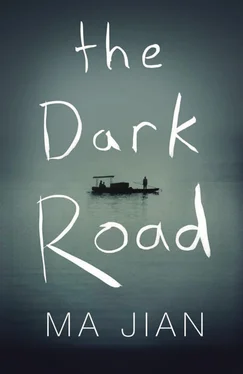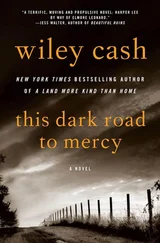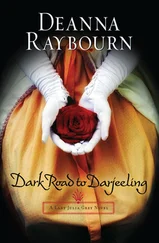‘You must make a fortune!’ Kongzi says. ‘A hundred and fifty yuan just to look? That’s robbery! This boat only cost me three thousand.’ Kongzi bites his lip, remembering that he told Weiwei it cost him much more.
‘No one gets rich from this trade. Only five or six families a year turn up here looking for dead relatives, and we have to buy all the rope and plastic sacks ourselves. There are four of us fishing corpses, and none of us have made much money. If you don’t believe me, go and ask them.’
‘Does the woman in the purple jacket have grey hair?’ asks Weiwei, scrutinising the man’s face.
‘A few grey hairs, perhaps. Not many. See, I’m an honest man. If you’d asked Chang, he would’ve lied to you.’
‘All right, let me see her. Where is she?’
‘All the bodies are tethered to poles under the floating rubbish. But I can’t show you the woman in the purple jacket. She belongs to Chang. We stick to the rules here. He’s gone into town today. He’ll be back tomorrow.’
Kongzi whispers to Weiwei that they should speak to the other corpse fishers, then in a louder voice asks the man if there’s a police station nearby.
‘Yes, a station was opened near here a couple of years ago,’ he answers. ‘The police used to pay us a hundred yuan to pull out the bodies, then would take them away to be cremated. But so many bodies washed up last year, the police couldn’t cope. For a while, they’d still come once a week, to photograph the corpses and cut locks of hair. But money is tight now, and they’ve stopped coming altogether. So we have to rely entirely on people like you for our income.’
Weiwei and Kongzi climb the littered bank towards shelters further up, pinching their noses from the stench.
‘Stinks, doesn’t it?’ the corpse fisher shouts out to them, putting on his straw hat. ‘It’s not easy living here, I tell you!’
They come to a shelter surrounded by heaps of plastic bottles. A man steps out, holding a can of Coke.
‘Hello, my friend,’ Weiwei says. ‘I’m looking for my mother. She’s sixty-five, with grey hair. Have you seen any bodies like that recently? Here, have a smoke.’ He hands the man a cigarette and searches his pocket for a lighter.
‘I saw an old woman’s corpse bobbing on the water yesterday, but it was bloated and decayed.’
Kongzi glances back at the man they just spoke to, annoyed that he made no mention of this body to them.
‘How long would it take for a corpse to reach that state?’ Kongzi asks.
‘I’m not in the business, but I should think three weeks at least, a bit less if crabs have got to it. Old Gui down there keeps his bodies under the rubbish for six months. If no one comes to claim them, he drags them back to the river and lets the current sweep them away. But by then they’re unrecognisable.’
‘So you don’t keep any corpses yourself?’ asks Kongzi, stepping back from a cockroach he sees crawling towards his feet.
‘No, no! That work would give me nightmares. Every morning, the corpse fishers row out into the floating rubbish to check if any bodies have got trapped beneath it during the night. When they come across a patch that smells particularly bad, or has flies hovering above it, they plunge their hooked poles into it, hoping to pull up a body. I don’t have the stomach for that.’
‘Do you ever get babies washing up here?’ Kongzi asks, his mind turning to Happiness.
‘Huh! More dead babies wash up here than dead fish! But no families ever come looking for them, so the body fishers leave them to rot on the bank.’
Kongzi whisks the flies from his face and glances at the shacks above.
‘Don’t bother asking the other guys,’ the man says. ‘They’ll con you out of all your money. I doubt your mother’s here. The bodies I’ve seen recently have been either much older or younger.’
Kongzi and Weiwei return to the boat. Meili is still standing at the stern, her hand clamped over her mouth. ‘The stench is unbearable,’ she groans as the men step aboard. The brown water below is littered with white polystyrene, empty cans and dead fish. Weiwei stares down dejectedly. ‘Perhaps her body has got caught on an anchor, or under a rock on the riverbed, or perhaps it’s been swept further downstream and I’ll never find it.’
The river and sky are darkening, but the pale swathe of floating refuse is still glowing faintly. Kongzi retreats into the cabin. Meili follows him inside and says, ‘I can’t stand the smell any longer, and I’m getting bitten to death by the mosquitoes. Let’s get out of here.’
‘We should give him a bit more time,’ Kongzi replies, lighting a cigarette.
‘No, I’ve had enough. I don’t care about the money. This place is a floating graveyard. Who knows how many corpses are bobbing under the rubbish?’
‘Be quiet — you’ll upset him,’ Kongzi whispers, peeping round the door curtain at Weiwei, who’s still leaning overboard staring down at the floating debris. ‘Do we have any beer left?’ Kongzi asks.
‘No,’ Meili snaps. She wants to scream out in anger, but doesn’t dare open her mouth too wide in case the insects swarming around her fly inside.
‘Anything to eat?’ Kongzi asks tentatively.
‘No, nothing!’ Meili shouts.
Kongzi goes out onto the deck and pats Weiwei’s trembling shoulders. ‘Shall we get going, my friend? If we don’t leave this wretched place soon, we’ll have to spend the night here.’
‘Yes, let’s sail upstream and find a better place to anchor,’ Meili says, joining them outside. ‘It’s too late to go home now. Don’t worry, we won’t charge you any extra for the night.’
Weiwei reluctantly nods in agreement. Meili goes to the stern, presses a towel to her mouth and starts the engine. As the boat sets off, the breeze becomes cooler and fresher. But the backwater’s stench has infused her skin, and whenever it drifts up to her nose, she gags. They sail upstream in the dying light, and her eyes fill with tears as she wonders whether Happiness’s body is still lying on the bed of the Yangtze, or has been swept down to this backwater as well, and is decaying under the floating rubbish along with all the other rotting corpses.
‘After our second child was ripped out of Meili’s womb and murdered by the authorities, we gave him a water burial in the Yangtze,’ Kongzi tells Weiwei, crushing out his cigarette. ‘At least I know now that if he’d washed up here, the corpse fishers would have left him alone.’
Weiwei looks at him, his face seized up in horror, then buries his head into his folded arms and weeps like a child.
Meili steers the boat towards a distant mooring place below a cluster of brick shacks. In the deep dusk, the water’s surface has become as smooth as skin, tearing open as the bow cuts through it then sealing up again behind the stern.
Keywords: Tortoiseshell Glasses,
KEYWORDS: tortoiseshell glasses, greatest good, wet dress, preserved mustard greens, peace of mind.
KONGZI TIES THE boat to a small wooden jetty that is coated in fine cement dust. He looks up and sees a brick shack with a wooden sign that says GOOD FOOD RESTAURANT. A child is squatting down for a shit next to a telegraph pole. In a shed close by, an engine is loudly chugging.
They enter the restaurant. Kongzi studies the menu and orders sweet and sour fish, spicy spare ribs, fried string beans and a bottle of rice wine. On a television in the corner, a woman in a flowery dress is singing, ‘ Your tenderness bewilders me. My fate is loneliness… ’ The food is brought to the table. Meili stares at the darkness outside the window, glancing occasionally at Kongzi and Weiwei whose faces soon turn red from the alcohol.
Читать дальше












